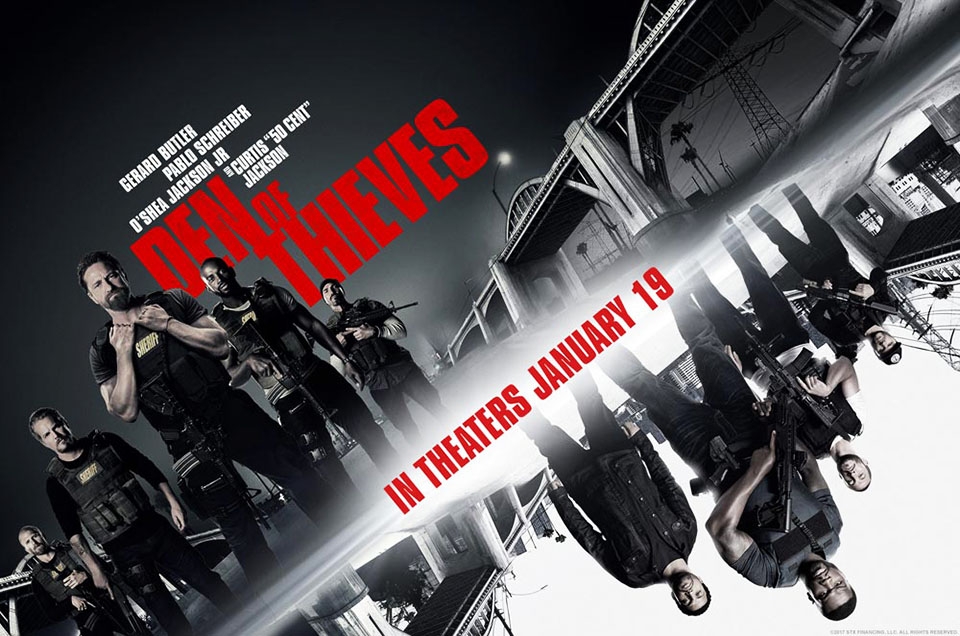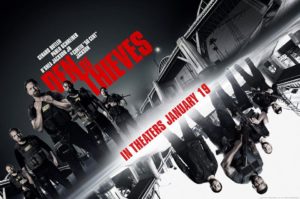

Aided by its star-studded cast, Den of Thieves performed above its projected gross rant of $7-$10 million by grossing $15.3 million in its first week. The movie placed third in the box office.
By Nicole Prieto | Staff Writer
01/25/2018
Den of Thieves is a power fantasy that blends the trappings of a smart crime-thriller and operatic drama. The film pits convicts against cops in a deadly cat-and-mouse game involving one of the least “caseable” banks in the nation: the Federal Reserve.
Ray Merrimen (Pablo Schreiber) is a released convict determined never to be put behind bars again, who leads one of the most professionally organized group of thieves in the bank-robbery hotbed of Hawthorne, Los Angeles. But when the botched theft of an armored car at a donut shop leaves a body count, the stakes suddenly change. With an unimaginable sum of money on the horizon, and the rest of their lives on the line, Merrimen’s group prepares to face off against Los Angeles’ best to pull off one last historic heist.
“Big Nick” O’Brien (Gerard Butler) heads the Los Angeles County Sheriff’s Department’s efforts in putting together the mystery behind several unsolved crimes. Foul-mouthed, unkempt and unabashed at eating donuts dropped by a dead guard at a crime scene, Nick is the embodiment of the “bad cop” trope. This character is certainly Butler at his most performatively masculine, perhaps trumped only by his role as Leonidas in 300. Nick leads a similarly-minded ragtag team of officers who skirt the rules of décor and professionalism. His group is the first on the scene to deal with the latest bizarre heist that leaves some guards and responding officers dead.
Viewers looking for a fun, mindless ride may have to temper their expectations. The film has its fair share of shootouts and tense robbery scenes to satisfy any action fan, but it takes its time with character building — at least, for the handful of the cast afforded adequate attention. At the outset, the latter is perhaps its most glaring and unnecessary weakness. The all-male main cast is big. It is so big, in fact, that audience members should be thankful for the onscreen superimposed text indicating who some of the major characters are. For everyone else, either memorize the IMDb cast list before you go in, or be prepared to list off “Henchman 1” or “Officer 3” in your head through the end.
Aside from major names like Butler, 50 Cent (Levi Enson) or Straight Outta Compton’s O’Shea Jackson Jr. (Donnie Wilson), observant Walking Dead fans will also find Cooper Andrews. In TWD, Andrews plays King Ezekiel’s right-hand man, Jerry. For this longtime viewer, Andrews regrettably does not have as obvious a role in Merrimen’s crew — much like 90 percent of the cast. The film does a good job of convincing us that everyone has some important role to play; it just skirts around giving us time to absorb who everyone is or what they are doing. The confusion drags the pace of an otherwise engaging film.
One thing this reviewer certainly was not expecting was the thoughtfulness given to the heist details itself. Without spoiling too much, Merrimen’s crew puts together an impressive plan that leaves viewers, and Nick, just enough in the dark to keep things interesting. Amidst Merrimen’s detailed planning, however, he becomes a strange, omniscient presence in Nick’s life to the point of being unrealistic. The lack of a strong “chemistry” in their rivalry does not help, though that is hardly a fatal flaw.
One item to appreciate is that, even though Nick is the hero we have to side with, the movie does not indulge in making everything in his life right again as he gets closer to figuring out Merrimen’s plans. Nick is, naturally, a jerk. We bear witness to his marital problems, inappropriate work conduct and racism — and it is difficult to tell whether he is sincere about the latter or putting on an act. While audience members will believe in his soft spot for his daughters, the film karmically treats his mess-ups with realistic severity. A scene with his soon-to-be ex-wife cements him as a protagonist with serious issues, making him more an unlikable antihero and less like Dwayne Johnson in 2015’s San Andreas. That is, Nick is not a sympathetic divorcee with a heart of gold; he is a mess who needs to straighten out his priorities.
For all its incredibly brazen hypermasculinity, Den of Thieves is a self-aware, melancholic experience that cannot help but trouble viewers about what is really on the line. Lives literally come at a cost in the movie, and we are not really left feeling triumphant once the end credits roll. Perhaps this is for the best. No matter what you think of the middle, the ending carries some interesting surprises that should leave audiences satisfied, even if there is arguably some tone whiplash involved. While maybe not slated for the Oscars, it is a worthy flick to spend an afternoon in a theater for.




